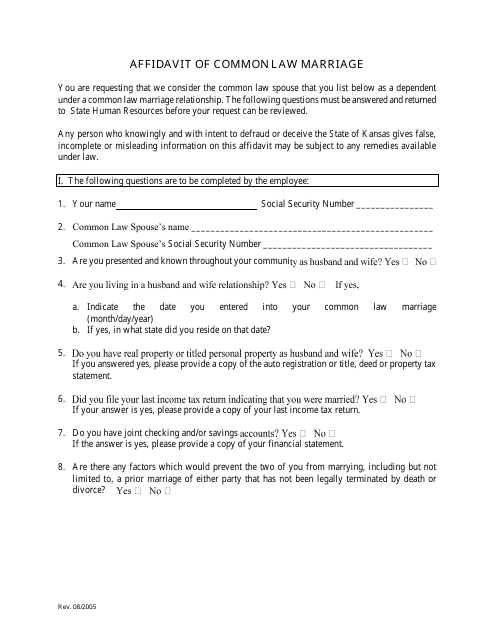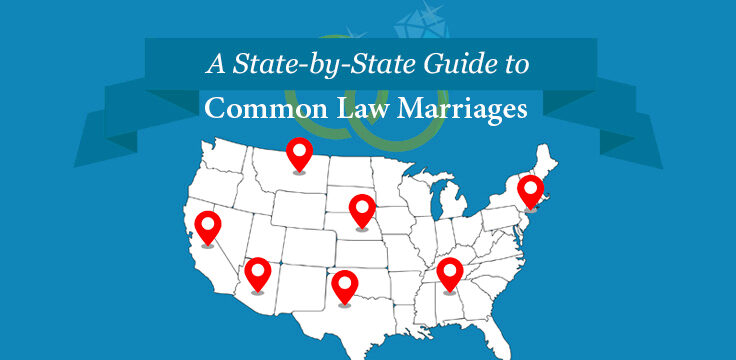Common Law Marriage in Kansas Explained
Common law marriage is a unique form of union recognized in some states, including Kansas. Unlike traditional marriages, common law marriages do not require a marriage license or a formal ceremony. In Kansas, couples may be considered legally married even without these formalities, provided they meet certain conditions. Understanding how this works can be essential for those in long-term relationships who want to know their legal status.
Legal Requirements for Common Law Marriage

In Kansas, there are specific legal requirements for a couple to be recognized as common law married. These include:
- Mutual Consent: Both partners must agree to be married and treat each other as spouses.
- Cohabitation: The couple must live together for a significant period of time, although Kansas law does not specify an exact duration.
- Public Representation: The couple must present themselves to others as being married. This can include using the same last name, filing joint taxes, or referring to each other as husband and wife.
It is important to note that both partners must be of legal age and sound mind. Additionally, individuals who are already married cannot enter into a common law marriage with another person. Meeting these criteria is essential to be considered legally married under common law in Kansas.
Rights and Responsibilities of Common Law Spouses
Once a couple is recognized as common law married in Kansas, they are entitled to many of the same rights and responsibilities as traditionally married couples. These include:
- Property Rights: Common law spouses share ownership of assets acquired during the relationship, similar to a traditional marriage.
- Spousal Support: In the event of separation, one partner may be entitled to alimony or spousal support, depending on the circumstances.
- Inheritance Rights: Common law spouses may inherit from each other if one partner passes away without a will, under Kansas intestacy laws.
- Health and Insurance Benefits: Common law spouses may qualify for health benefits or insurance coverage through their partner’s employer, as well as other federal and state benefits.
On the other hand, common law marriage also brings certain responsibilities, including shared financial obligations, potential for joint debt, and legal implications in the event of separation or divorce.
How to Prove a Common Law Marriage in Kansas
Proving a common law marriage in Kansas can sometimes be challenging, as there is no official documentation like a marriage certificate. However, there are several ways to demonstrate that a common law marriage exists:
- Mutual Agreement: You must show that both partners had a clear, mutual agreement to be married. This could be demonstrated through written statements, testimonies from friends or family, or joint declarations.
- Cohabitation Evidence: Proof that you lived together as a couple is crucial. This can include rental agreements, property ownership, or even shared utility bills that show both partners at the same address.
- Public Representation: You need to show that you held yourselves out as a married couple. Evidence could include joint bank accounts, shared credit cards, joint tax filings, or using the same last name. Even referring to each other as “husband” or “wife” in public settings can help prove the marriage.
If there is any dispute about the existence of a common law marriage, courts may look at these factors to determine whether the couple met the requirements under Kansas law. It’s important to gather and maintain these pieces of evidence, especially in the event of legal matters such as inheritance, divorce, or spousal support claims.
Does Kansas Recognize Common Law Marriages from Other States?
Yes, Kansas recognizes common law marriages from other states, as long as the couple met the legal requirements of the state where the common law marriage was established. This is based on the Full Faith and Credit Clause of the U.S. Constitution, which requires states to honor the legal contracts and judgments of other states.
If a couple moves to Kansas from a state where their common law marriage was legally valid, Kansas will generally continue to recognize that marriage. However, if the couple is attempting to establish a common law marriage after moving to Kansas, they must meet Kansas-specific requirements for it to be valid.
It’s important to note that while Kansas recognizes common law marriages from other states, not all states recognize common law marriages. Therefore, if a couple moves out of Kansas, they should check the laws of the new state to ensure their marriage is still valid.
Termination of a Common Law Marriage
Ending a common law marriage in Kansas is similar to ending a traditional marriage. If a couple wishes to terminate their relationship, they must go through a formal divorce process. Simply separating and living apart is not enough to end the legal relationship in the eyes of the court.
The divorce process for common law marriages involves:
- Filing for Divorce: One spouse must file for divorce in the same manner as a traditionally married couple. This includes dividing assets, determining spousal support, and, if applicable, child custody arrangements.
- Property Division: Common law spouses have the same rights to property division as couples in a traditional marriage. Assets acquired during the marriage are typically considered marital property and subject to division.
- Spousal Support: Just like in a traditional divorce, one partner may be required to pay spousal support or alimony, depending on the circumstances of the marriage and financial situation.
Without a formal divorce, common law spouses remain legally married in Kansas. This means that if one partner attempts to remarry without obtaining a divorce, the new marriage would be considered bigamous and invalid.
Benefits and Challenges of Common Law Marriage
Common law marriage comes with both benefits and challenges, and understanding these can help couples decide if this informal arrangement is right for them.
Benefits of Common Law Marriage:
- No Formal Ceremony Required: Couples can avoid the costs and formality of a traditional wedding, as no ceremony or marriage license is needed.
- Legal Rights Similar to Marriage: Common law spouses in Kansas enjoy many of the same legal protections as traditionally married couples, including property rights, spousal support, and inheritance rights.
- Flexibility: Common law marriage offers a flexible alternative for couples who may not want the traditional structure of marriage but still desire legal recognition of their relationship.
- Health and Financial Benefits: Common law spouses may qualify for health insurance through a partner’s employer and may have access to benefits like Social Security or pension entitlements.
Challenges of Common Law Marriage:
- Difficulty in Proving the Marriage: Unlike a traditional marriage with a clear marriage certificate, proving a common law marriage can be more complex and may require substantial evidence.
- Varied Recognition by Other States: While Kansas recognizes common law marriage, not all states do. Moving to a state that does not recognize common law marriage can create legal complications.
- Formal Divorce Required: Even though no ceremony is needed to enter a common law marriage, a formal divorce process is still required to end the marriage. Simply separating is not enough.
FAQ About Common Law Marriage in Kansas
Here are some common questions about common law marriage in Kansas:
| Question | Answer |
|---|---|
| Is there a minimum period for cohabitation? | No, Kansas does not specify a minimum amount of time that a couple must live together to establish a common law marriage. However, the couple must meet the other legal requirements. |
| Can same-sex couples enter into a common law marriage in Kansas? | Yes, since the U.S. Supreme Court’s 2015 ruling, same-sex couples can enter into a common law marriage in Kansas, provided they meet the state’s legal requirements. |
| Can we have a common law marriage if one of us is still legally married to someone else? | No, Kansas law requires that both individuals be unmarried in order to enter into a common law marriage. |
| Do we need a written agreement to prove our common law marriage? | No written agreement is required, but having documentation or evidence of your mutual agreement to be married can be helpful in legal situations. |
Conclusion on Common Law Marriage in Kansas
Common law marriage in Kansas offers a legal path to marriage for couples who don’t want a formal ceremony or license. While it provides similar rights and protections as a traditional marriage, it also comes with challenges, such as the need for proof and the requirement of a formal divorce to end the union. For couples considering a common law marriage, it’s essential to understand both the benefits and potential hurdles that come with this type of relationship. Being informed can help ensure your rights are protected.


